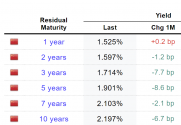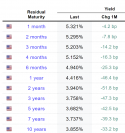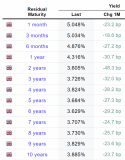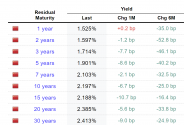Can someone confirm my understanding, isnt a higher yielding bond means the borrower is carrying more risks as the government pumps the yield to make the bond attractive relative to the risk.
Unless the government is going on a borrowing spree for some rapid expansionary economic plan or because there is a drop in the amount of debt being taken up, there is no reason to raise the yield.
I don't want sleep.. I mean chgough's answer please don't bother to reply to this.
Bond yield and Bond rates are separate things.
Let's say China issued a 10 year 100 RMB face value bond of 5% rate. In the next 10 years, this bond will be traded on the open market at transaction value of more than RMB100 if the demand is high or less than 100 RMB if the demand is low.
As far as the central bank is concern, regardless of whatever value the bonds are traded in the market, they will only liable to pay 5% on the face value of 100 RMB which is equal to RMB5. They are not going to pay more if the bond yeild is high in the open market, nor are they going to pay less if the bond yeild is low.
As for the investors, if they pay more due to high demand, and bought the bonds at RMB110, then to them the bond yeild is low as they will only receive RMB5 or their investment of RMB110. - Low Bond Yield.
ON the other hand if the bonds are traded at lower value of RMB90, then the investor will gain a higher yeild of RMB5 on their investment of only RMB90.
1) Changes in bond yieds does not change the bond rates (eaxample 5%) that the government is paying.
2) Low bond yields on the market means the demand for the bond is high, as investors have high confidence that the government will not default on repayment when the bonds are due/matured.
3) On the other hand if a bond is considered junk bond or the government that issued the bonds has financial difficulties, investors will only buy the bonds if the yeild is high because they are taking high risk in their investment, in fact they are gambling hoping the government will have money to pay them back. Junk Bonds are traded at much lower prices than their face value.




